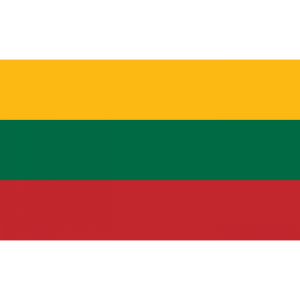Language/Lithuanian/Grammar/Future-Tense
Hi Lithuanian learners! 😊
In this lesson, we will cover the future tense in Lithuanian. We will explore its usage, structure, and see some examples. By the end of the lesson, you will be able to use the future tense correctly in Lithuanian. Let's get started!
Take a moment to explore these relevant pages as you conclude this lesson: Noun Gender and Declension & Nominative and Accusative Cases.
What is the Future Tense[edit | edit source]
The future tense is used to express an action that will happen in the future. It can also convey probability or intention. In Lithuanian, the future tense is formed using the verb 'būsiu' which means 'to be.'
Future Tense - Structure[edit | edit source]
To conjugate the future tense in Lithuanian, you need to take the infinitive form of the verb, remove the final -ti and add the appropriate form of the verb 'būsiu.'
Singular[edit | edit source]
For the singular form, you use the following endings:
| Lithuanian | Pronunciation | English |
|---|---|---|
| šokti (to dance) | [ʃɔktʲɪ] | I will dance: aš šok[būsiu] |
| kalbėti (to speak) | [kɐlʲbʲeːtʲɪ] | I will speak: aš kalb[būsiu] |
| daryti (to do) | [dɐrʲɪtʲɪ] | I will do: aš dar[būsiu] |
Plural[edit | edit source]
For the plural form, you use the following endings:
| Lithuanian | Pronunciation | English |
|---|---|---|
| šokti (to dance) | [ʃɔktʲɪ] | We will dance: mes šok[būsime] |
| kalbėti (to speak) | [kɐlʲbʲeːtʲɪ] | We will speak: mes kalb[būsime] |
| daryti (to do) | [dɐrʲɪtʲɪ] | We will do: mes dar[būsime] |
Examples[edit | edit source]
To put the theory into practice, let's look at some examples:
- Aš rytoj kalbėsiu su mano drauge. (I will speak to my friend tomorrow.)
- Mes sekmadienį valgysime picą. (We will eat pizza on Sunday.)
- Jie šokti nebebus malonu. (They will not enjoy dancing anymore.)
Tips and Tricks[edit | edit source]
Here are some tips and tricks to help you use the future tense effectively:
- Use time expressions such as rytoj (tomorrow), kitą savaitę (next week), or kitais metais (next year) to make it clear that the action will happen in the future.
- Keep in mind that the simple present tense can also be used to indicate future events where there is no need to emphasize the futurity.
- You can use the future tense to express your intentions, but remember that intentions may change, so use it with caution.
Cultural Information[edit | edit source]
In Lithuania, people are known for being resilient, creative, and hardworking. They value education, music, and sports. The Lithuanian language is one of the oldest languages in the world and has a unique grammatical structure. The country has a rich history and cultural heritage, which includes traditions such as folk songs (dainos), dance (šokis), and festivals (vakarėliai). If you want to learn more about Lithuanian culture, find native speakers and ask them any questions!
Sources[edit | edit source]
- Lithuanian grammar - Wikipedia
- Lithuanian verb conjugator
- The Lithuanian Participles: Their System and Functions
➡ If you have any questions, please ask them in the comments section below.
➡ Feel free to edit this wiki page if you think it can be improved. 😎

